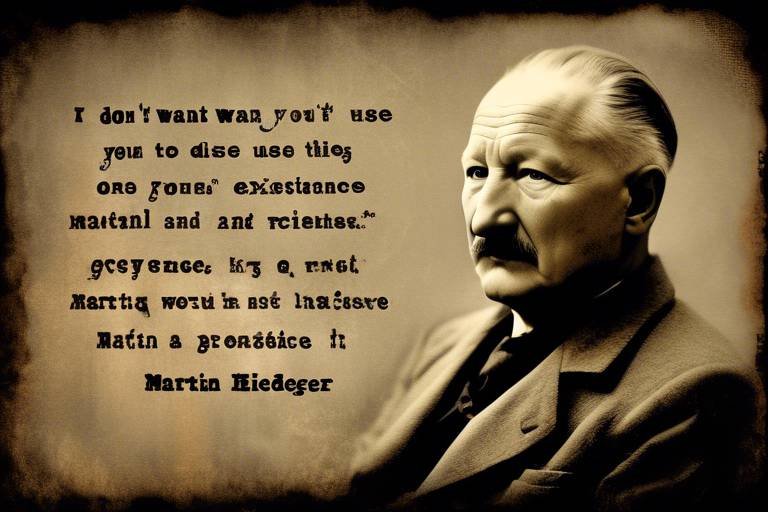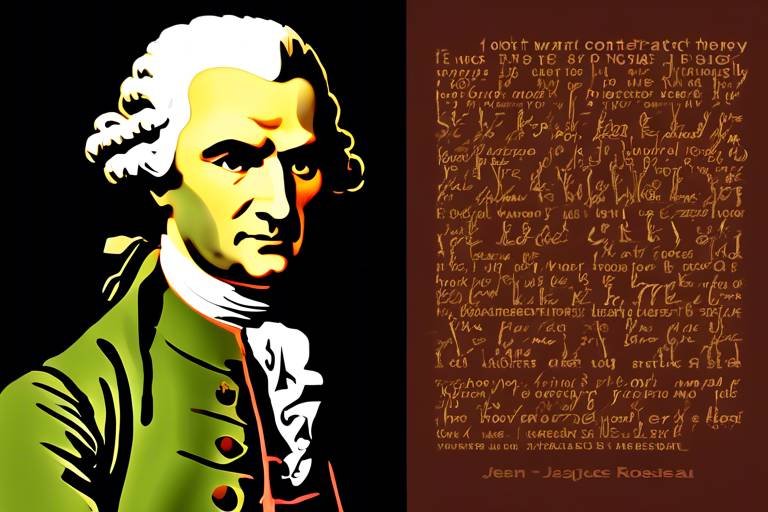Martin Heidegger's Thoughts on Existence and Being
In the realm of philosophy, few thinkers have provoked as much thought and debate as Martin Heidegger. His explorations into the nature of existence and being challenge us to reconsider our understanding of what it means to be human. Heidegger invites us to delve into the depths of our own existence, urging us to confront the fundamental questions that shape our lives. His work is not just an academic exercise; it is a profound journey into the essence of reality itself, compelling us to reflect on our place in the world.
Heidegger's philosophy is a tapestry woven with threads of existential inquiry, where each strand represents a different aspect of our being. He posits that the essence of being is not merely something to be defined or categorized; rather, it is an experience to be lived. This approach shifts the focus from abstract theories to the rich, textured reality of human life. When we think about existence, we are not just contemplating a concept; we are engaging with the very fabric of our daily experiences, emotions, and interactions.
As we embark on this exploration of Heidegger's thoughts, we will uncover how his ideas resonate with our contemporary understanding of existence. From the notion of Dasein—the unique way humans exist in the world—to the intricate relationship between language and being, Heidegger's insights provide a roadmap for navigating the complexities of our own lives. His emphasis on authenticity urges us to embrace our individuality, while his reflections on mortality remind us that our time is finite, prompting us to seek deeper meaning in our existence.
In this article, we will break down Heidegger's key concepts and examine their implications for our understanding of reality. We will also explore how his critiques of technology and modernity challenge us to reconsider our relationship with the world around us. Through this journey, we aim to illuminate the profound insights that Heidegger offers, transforming the way we think about existence and our place within it.
- What is the main focus of Heidegger's philosophy?
Heidegger's philosophy primarily focuses on the nature of existence and being, challenging traditional metaphysical concepts and emphasizing the lived experience of individuals. - What does 'Dasein' mean?
'Dasein' refers to the unique way humans exist in the world, characterized by awareness and engagement with their surroundings. - How does Heidegger view technology?
Heidegger critiques technology's impact on existence, suggesting it can lead to alienation from authentic being and urging a reevaluation of our relationship with technology.

Heidegger's Concept of Being
This article explores Martin Heidegger's profound insights into existence and being, examining his philosophical contributions and their implications for understanding human experience and the nature of reality.
When we dive into , we're not just skimming the surface of philosophical jargon; we're embarking on a journey that challenges the very foundation of how we think about existence. Heidegger takes a bold stance against traditional metaphysics, which often pigeonholes existence into neat little categories. Instead, he invites us to look beyond these confines and to embrace the lived experiences of individuals as they navigate through the world. This shift in perspective is like stepping into a vibrant painting, where each brushstroke represents a unique human experience, rather than a static image defined by rigid boundaries.
At the heart of this exploration is the notion that understanding Being is not merely an intellectual exercise; it's a deeply personal quest. Heidegger urges us to confront the question of existence head-on. Think about it: have you ever paused to ponder why you are here? What it means to truly exist? These are not just philosophical musings; they are the essence of what it means to be human. Heidegger's philosophy challenges us to take a step back and reflect on our own being, to recognize that our existence is intricately woven into the fabric of the world around us.
To illustrate this, consider the concept of Dasein, which translates to "being-there." This term encapsulates the unique way humans exist, characterized by an acute awareness of our surroundings and an active engagement with our environment. Dasein is not just a passive observer; it is an active participant in the unfolding of existence. This interplay between self and world is crucial, as it highlights that our understanding of Being is not isolated. Instead, it is a dynamic relationship that shapes our identity and experience.
Heidegger also introduces the idea of authenticity and inauthenticity in our existence. Authenticity, in Heidegger's view, involves embracing our individuality and making choices that resonate with our true selves. On the flip side, inauthenticity arises when we conform to societal norms and expectations, losing touch with our genuine selves. This distinction is vital, as it compels us to examine how we navigate our lives and the choices we make. Are we living authentically, or are we merely going through the motions, shaped by external pressures?
Moreover, Heidegger's exploration of Being leads us to the profound concept of being-toward-death. This idea posits that an awareness of our mortality can serve as a catalyst for a more authentic and meaningful life. It’s a bit like standing on the edge of a cliff, where the vastness of existence suddenly becomes clear. When we confront the reality of our finite existence, we are prompted to make choices that reflect our true desires and aspirations. In this way, death is not merely an end; it is a lens through which we can better understand the value of our lives.
In summary, Heidegger's concept of Being is a rich tapestry that invites us to explore the depths of our existence. It challenges us to look beyond traditional metaphysical boundaries, to engage with our surroundings actively, and to reflect on the authenticity of our choices. Through Dasein, authenticity, and the awareness of our mortality, Heidegger provides us with a framework to navigate the complexities of existence. So, the next time you find yourself pondering the meaning of life, remember that it’s not just about finding answers; it’s about embracing the journey of understanding what it truly means to be.
- What is Dasein in Heidegger's philosophy? Dasein refers to the unique way humans exist, characterized by awareness and engagement with their surroundings.
- How does Heidegger define authenticity? Authenticity involves embracing one's individuality and making choices that reflect one's true self, rather than conforming to societal expectations.
- What does being-toward-death mean? It suggests that awareness of mortality can lead to a more authentic and meaningful life, prompting individuals to make choices aligned with their true desires.
- Why is Heidegger's concept of Being important? It challenges traditional metaphysics and encourages a deeper understanding of existence, emphasizing the importance of lived experiences.

The Question of Existence
When we dive into the depths of philosophy, one question looms larger than the rest: What does it mean to exist? For Martin Heidegger, this isn't just a trivial inquiry; it's the very foundation of philosophical thought. Heidegger encourages us to confront our own being, to ponder our existence in relation to the world around us. Have you ever stopped to think about why you are here? What makes your life meaningful? These questions are not just academic; they touch the core of our human experience.
Heidegger posits that the question of existence is fundamental to understanding who we are and how we relate to everything else. He challenges us to look beyond the surface of our daily lives and recognize the profound implications of our existence. This exploration is not merely an abstract exercise; it is a call to engage deeply with our own lives and the world we inhabit. By doing so, we can uncover layers of meaning that are often obscured by routine and distraction.
At the heart of this inquiry lies the concept of Dasein, or 'being-there.' Dasein encapsulates the unique way humans exist, characterized by our awareness and engagement with our surroundings. It's not just about being alive; it's about being present, fully aware of our existence and the choices we make. This brings us to a critical realization: our existence is not isolated. We are intertwined with our environment, our relationships, and our experiences. The interplay between self and world shapes our understanding of who we are.
Heidegger's exploration of existence also leads us to consider the nature of our choices. Are we living authentically, embracing our individuality, or are we falling into the trap of inauthenticity, conforming to societal norms and expectations? This distinction is vital. Authentic living involves a conscious choice to be true to oneself, while inauthenticity often leads to a life devoid of meaning. It’s like wearing a mask every day; you might fit in, but at what cost to your true self?
Furthermore, Heidegger introduces the idea of being-toward-death, a concept that may seem morbid at first glance but is profoundly liberating. Awareness of our mortality can serve as a catalyst for living a more meaningful life. When we recognize that our time is limited, we are prompted to prioritize what truly matters. This awareness can push us to make choices that resonate with our authentic selves, rather than what society dictates.
In essence, the question of existence is not just philosophical jargon; it's an invitation to explore the very fabric of our lives. It challenges us to reflect on our choices, our relationships, and our ultimate purpose. Are we merely existing, or are we truly living? This exploration can lead to a richer, more fulfilling life, one that is deeply rooted in our unique experiences and authentic being.
- What is Dasein? Dasein refers to the unique way humans exist, characterized by awareness and engagement with their surroundings.
- How does Heidegger define authenticity? Authenticity involves embracing one's individuality and making conscious choices, as opposed to conforming to societal norms.
- What is the significance of being-toward-death? Being-toward-death encourages individuals to recognize their mortality, leading to a more meaningful and authentic life.
- Why is the question of existence important? It prompts us to reflect on our lives, our choices, and our relationships, ultimately guiding us towards a richer understanding of our purpose.

Dasein: Being-there
At the heart of Martin Heidegger's philosophy lies the concept of Dasein, a term that translates to "being-there." This notion captures the essence of human existence in a way that transcends mere physical presence. Dasein is not just about occupying space; it embodies the idea that human beings are fundamentally intertwined with their surroundings and the world at large. Imagine standing on a bustling city street, the sounds of life swirling around you—the honking cars, the chatter of pedestrians, the distant music. In that moment, you are not just a body in a location; you are engaging with the world, feeling its vibrancy, and experiencing your existence as part of a larger tapestry of life.
Heidegger emphasizes that Dasein is characterized by a unique awareness of itself and its environment. This awareness allows individuals to reflect on their existence, making choices that shape their lives. It’s like being the protagonist in your own story, where every decision you make influences the plot's direction. Dasein is not static; it is dynamic and constantly evolving, shaped by experiences, relationships, and the passage of time. This fluidity is what makes our existence rich and meaningful, as we navigate through the complexities of life.
One of the key aspects of Dasein is its inherent interconnectedness with others. Heidegger posits that our being is not isolated; rather, it is deeply influenced by our interactions with other beings. Think of it as a dance—each person contributes to the rhythm and flow, creating a collective experience. This relational aspect of Dasein underscores the importance of community and shared experiences in shaping our understanding of existence. We are not alone in our journey; our lives are interwoven with the lives of others, creating a rich tapestry of human experience.
Furthermore, Dasein is marked by its temporal nature. Heidegger argues that we experience time as a complex interplay of past, present, and future. This means that our understanding of who we are is always influenced by where we have been and where we are headed. For instance, reflecting on past experiences can provide insights that shape our current choices, while our aspirations for the future can motivate us to act in the present. In this sense, Dasein is not just about existing in the moment; it’s about recognizing that every moment is a culmination of our life’s journey, filled with lessons and opportunities for growth.
In summary, Dasein encapsulates the essence of what it means to be human. It invites us to engage with our surroundings, reflect on our existence, and recognize the profound connections we share with others. By embracing the concept of being-there, we can cultivate a deeper understanding of ourselves and our place in the world, leading to a more authentic life.

Authenticity and Inauthenticity
When we dive into the philosophical waters of Martin Heidegger, we encounter the intriguing concepts of authenticity and inauthenticity. These ideas are not just abstract notions; they resonate deeply with our everyday lives. Heidegger argues that authenticity is about embracing our true selves and making conscious choices that reflect our individuality. In contrast, inauthenticity arises when we conform to societal pressures, losing touch with our own desires and aspirations. It's like wearing a mask that fits perfectly with the crowd, but inside, you feel a disconnect from who you really are.
Heidegger suggests that many of us live our lives in a state of inauthenticity, often influenced by the expectations of others. This can manifest in various ways, such as:
- Following trends without questioning their value
- Choosing careers based on family pressure rather than personal passion
- Engaging in relationships that don’t fulfill us, simply to avoid loneliness
This state of being can lead to feelings of emptiness and dissatisfaction. In contrast, when we embrace authenticity, we begin to make choices that resonate with our true selves. Heidegger encourages us to confront our existence, to ask hard questions about who we are and what we truly want. This journey toward authenticity is not always easy; it often requires us to face uncomfortable truths about ourselves and the world we inhabit.
To illustrate the difference between authentic and inauthentic existence, consider the following table:
| Aspect | Authenticity | Inauthenticity |
|---|---|---|
| Self-awareness | High | Low |
| Decision-making | Based on personal values | Influenced by external expectations |
| Life satisfaction | High | Low |
| Relationships | Genuine connections | Superficial interactions |
By recognizing the differences between these states of being, we can start to cultivate a more authentic existence. This journey often involves stepping outside of our comfort zones, taking risks, and making choices that may not align with societal norms. However, the reward is a deeper sense of fulfillment and connection to our true selves. It’s about living life on our own terms, which is ultimately a more enriching experience.
In conclusion, Heidegger's exploration of authenticity and inauthenticity invites us to reflect on our own lives. Are we living authentically, or are we merely going through the motions? By engaging with these questions, we can begin to carve out a path that leads to a more meaningful existence.
- What does Heidegger mean by authenticity?
Authenticity, according to Heidegger, refers to living in accordance with one's true self and making choices that reflect one's own values and beliefs. - How can I achieve authenticity in my life?
Achieving authenticity involves self-reflection, questioning societal norms, and making choices that align with your personal values and desires. - What are the consequences of inauthentic living?
Living inauthentically can lead to feelings of emptiness, dissatisfaction, and disconnection from oneself and others.

Being-toward-death
Martin Heidegger's concept of is a profound exploration of how our awareness of mortality shapes our existence. It’s not just about the end of life; rather, it’s about how the inevitability of death influences our choices, values, and ultimately our authenticity. Heidegger argues that by acknowledging our mortality, we can live more fully and meaningfully. Imagine standing on the edge of a vast cliff, feeling the wind whip around you, reminding you of the precariousness of life. This awareness can ignite a spark within us, pushing us to embrace our true selves and make choices that resonate with our individual essence.
In Heidegger's view, many individuals live in a state of denial regarding death, often distracting themselves with the mundane aspects of life. This inauthentic existence can lead to a sense of alienation and a lack of fulfillment. When we fail to confront death, we risk falling into the trap of conformity, where we merely go through the motions of life without truly engaging with our own being. On the other hand, embracing the reality of our mortality can liberate us. It encourages us to shed societal expectations and live in accordance with our true desires and values.
To better understand this concept, consider the following implications of being-toward-death:
- Awareness of Mortality: Recognizing that life is finite can motivate us to prioritize what truly matters.
- Authenticity: By confronting our mortality, we can make choices that reflect our genuine selves rather than conforming to external pressures.
- Embracing Uncertainty: Accepting death allows us to embrace the unknown, leading to a richer, more vibrant experience of life.
Heidegger’s insights suggest that by reflecting on our death, we can unlock a deeper appreciation for life itself. This perspective invites us to ask ourselves crucial questions: Are we living authentically? Are we making choices that reflect our true selves? The answers to these questions can lead us on a path toward a more meaningful existence. In essence, being-toward-death serves as a reminder that life is not just about existing; it’s about truly living, engaging with the world, and making the most of our time.
Ultimately, embracing the concept of being-toward-death can transform our understanding of existence. It encourages us to live with intention, to value our relationships, and to pursue our passions. Just as the knowledge of an approaching storm can make us appreciate the calm before it, so too can the awareness of our mortality enhance our appreciation of life. By acknowledging death, we can cultivate a deeper connection to our own being and the world around us.
- What does Heidegger mean by being-toward-death?
Being-toward-death refers to the idea that awareness of our mortality can profoundly influence how we live, encouraging authenticity and meaningful choices. - How can contemplating death lead to a more authentic life?
By confronting the reality of death, we are prompted to prioritize what truly matters to us, leading to choices that reflect our true selves rather than societal expectations. - Is being-toward-death a pessimistic view?
No, it is not pessimistic. Instead, it offers a liberating perspective that emphasizes the importance of living fully and authentically in the present.

Time and Temporality
Heidegger's exploration of 'Being' challenges traditional metaphysics, emphasizing the importance of understanding existence beyond mere categorization and focusing on the lived experience of individuals in the world.
Heidegger posits that the question of existence is fundamental to philosophy, urging individuals to confront their own being and the nature of their existence in relation to the world around them.
Central to Heidegger's thought, 'Dasein' refers to the unique way humans exist, characterized by awareness and engagement with their surroundings, highlighting the interplay between self and world.
Heidegger distinguishes between authentic and inauthentic existence, where authenticity involves embracing one's individuality and choices, while inauthenticity stems from conforming to societal norms and expectations.
Heidegger introduces the concept of 'being-toward-death' as a means of understanding existence, suggesting that awareness of mortality can lead to a more authentic and meaningful life.
When we dive into Heidegger's thoughts on time and temporality, we begin to unravel a complex tapestry that transcends the simple ticking of a clock. Heidegger argues that human beings do not experience time in a linear fashion; instead, our perception of time is a rich interplay of the past, present, and future. This intricate relationship shapes our understanding of existence itself. Imagine time as a river, where the currents of our past experiences flow into the present moment, while the future looms ahead like a distant shore. Each wave carries with it the essence of who we are, highlighting that our existence is not just a series of isolated moments but an ongoing journey.
Heidegger also emphasizes that our relationship with time is inherently tied to our being. We are not mere observers of time; we actively engage with it. This engagement can be seen in how we reflect on our past, anticipate the future, and fully immerse ourselves in the present. He introduces the concept of temporality, which suggests that our understanding of existence is deeply rooted in our temporal experience. In this sense, our identity is shaped by our memories and aspirations, making time a crucial element in the formation of our selfhood.
To further illustrate, consider the following aspects of Heidegger's view on time:
- Past: Our history and experiences inform our current choices and perspectives.
- Present: The only moment we can actively engage with, where our decisions shape our reality.
- Future: Represents potential and possibility, urging us to envision what we can become.
In essence, Heidegger's exploration of time compels us to reflect on how we navigate our existence. Are we merely drifting along the current, or are we consciously steering our vessel? By understanding time as a fluid construct, we gain the power to shape our lives more authentically. This perspective not only deepens our comprehension of existence but also challenges us to live more fully in each moment.
Heidegger emphasizes the relationship between language and being, arguing that language shapes our understanding of existence and is fundamental to expressing and exploring the nature of reality.
Heidegger views poetry as a vital expression of being, suggesting that it reveals truths about existence that conventional language often fails to capture, allowing deeper insights into human experience.
In his later work, Heidegger critiques technology's impact on existence, arguing that it can lead to alienation from authentic being, urging a reevaluation of our relationship with technological advancements.
- What is Dasein? Dasein is a key concept in Heidegger's philosophy, referring to the unique way humans exist and engage with the world around them.
- How does Heidegger view time? Heidegger believes that time is not linear but a complex interplay of past, present, and future, which shapes our understanding of existence.
- What is the significance of authenticity? Authenticity involves embracing one's individuality and choices, leading to a more meaningful existence, while inauthenticity arises from conforming to societal norms.

Language and Meaning
Martin Heidegger's exploration of language is nothing short of revolutionary. He believed that language is not merely a tool for communication, but rather a fundamental medium through which we understand our existence. In Heidegger's view, the relationship between language and being is deeply intertwined, suggesting that our grasp of reality is shaped significantly by the words we use. This perspective challenges the conventional understanding of language as a simple conveyer of information. Instead, it positions language as a living entity that molds our perception of the world, revealing the essence of our being.
Heidegger argues that traditional metaphysics often overlooks the profound influence of language on our experience. He posits that language is the house of being, meaning that it is within language that we find the essence of our existence. To illustrate this, consider how different languages encapsulate diverse worldviews. For instance, the way time is expressed varies significantly across cultures, which can lead to different understandings of existence itself. This is not just a linguistic curiosity; it reflects a deeper philosophical truth about how we engage with the world around us.
Moreover, Heidegger emphasizes that language is not static; it evolves and transforms, just as we do. This fluidity allows for a dynamic interaction between language and our understanding of being. As we grow and change, so too does our language—shaping and reshaping our comprehension of reality. He believed that through language, we can access truths about our existence that are often obscured by the mundane aspects of daily life. For Heidegger, poetry serves as a prime example of this transformative power of language.
In his view, poetry is not simply an artistic expression but a profound means of uncovering the depths of being. It transcends the limitations of conventional language, allowing for a more authentic exploration of human experience. Through poetic language, we can tap into the essence of our existence and articulate feelings and thoughts that are often inexpressible in everyday speech. Heidegger famously stated, “Language is the house of being,” highlighting the idea that through language, we can find a sense of belonging and connection to the world.
However, Heidegger also recognized that the modern world poses challenges to this relationship between language and being. With the rise of technology and the commodification of language, there is a risk of alienation from authentic expression. As language becomes more transactional and utilitarian, we may lose touch with its deeper meanings and the richness of our existence. This alienation can lead to a disconnection from our true selves, making it imperative to reevaluate our relationship with language in today's society.
In summary, Heidegger’s insights into language and meaning compel us to reflect on how we communicate and understand our existence. By recognizing the profound impact of language on our perception of reality, we can begin to appreciate the nuances of our experience and strive for a more authentic engagement with the world. As we navigate through life, let us remember that our words shape our reality, and in turn, our reality shapes our words.
- What is the main idea behind Heidegger's philosophy of language?
Heidegger believed that language is not just a tool for communication but a fundamental part of understanding our existence and shaping our perception of reality. - How does poetry relate to Heidegger's concept of language?
Heidegger viewed poetry as a vital expression of being that reveals deeper truths about existence, transcending the limitations of conventional language. - What challenges does modern technology pose to language and being?
Heidegger argued that the commodification of language in the modern world can lead to alienation from authentic expression, making it essential to reevaluate our relationship with language.

The Role of Poetry
When we dive into the depths of Martin Heidegger's philosophy, we find that poetry holds a special place in his exploration of being. For Heidegger, poetry is not just a form of artistic expression; it is a profound way of revealing truths about existence that often elude conventional language. Just think about it: how often do we find ourselves at a loss for words when trying to express our deepest feelings? Poetry steps in here, acting as a bridge between our internal world and the external reality. It allows us to articulate the inexpressible, capturing the essence of human experience in a way that straightforward language simply cannot.
Heidegger believed that poetry has the power to unveil the hidden dimensions of our existence. He argued that through the act of writing and reading poetry, we engage with the world in a more authentic manner. This is because poetry invites us to pause, reflect, and truly listen to the nuances of our experiences. In a world that often prioritizes speed and efficiency, poetry encourages us to slow down and savor the richness of life. It’s like savoring a fine wine; you don’t rush through it but rather take your time to appreciate the complex flavors.
Moreover, Heidegger posited that poetry connects us to our roots and our history. It allows us to tap into the shared experiences of humanity, bridging gaps between individuals and cultures. By engaging with poetry, we can explore themes that resonate across time and space, such as love, loss, and the quest for meaning. In this way, poetry becomes a vehicle for understanding our place in the world, fostering a sense of belonging and continuity.
In essence, Heidegger saw poetry as a vital expression of being, one that reveals the layers of existence that we often take for granted. It serves as a reminder that language is not merely a tool for communication but a means of exploring and understanding our reality. As we engage with poetry, we are invited to embark on a journey of discovery—one that challenges us to reconsider our perceptions and embrace the complexity of our existence.
To further illustrate Heidegger's thoughts on poetry, consider the following table that summarizes the key roles poetry plays in understanding being:
| Role of Poetry | Description |
|---|---|
| Revealing Truths | Poetry unveils aspects of existence that conventional language cannot express. |
| Encouraging Reflection | It invites readers to pause and contemplate their experiences. |
| Connecting Humanity | Poetry bridges cultural and temporal divides, fostering shared understanding. |
| Exploring Meaning | It serves as a medium for exploring profound themes of existence. |
In conclusion, poetry, as articulated by Heidegger, is a fundamental aspect of our being. It is not just a collection of words; it is a dynamic force that shapes our understanding of ourselves and the world around us. So, the next time you read a poem, take a moment to reflect on its deeper meanings. You might just find that it resonates with your own existence in ways you never expected.
- What is the significance of poetry in Heidegger's philosophy?
Poetry reveals deeper truths about existence and allows for a more authentic engagement with the world. - How does poetry connect us to our humanity?
It bridges cultural and temporal divides, fostering shared experiences and understanding. - Can poetry influence our perception of reality?
Yes, it encourages reflection and exploration of complex themes, shaping our understanding of our existence.

Technology and Alienation
In our rapidly evolving world, the impact of technology on our lives has become a hot topic, and Martin Heidegger had some profound insights on this matter. He argued that technology, while offering convenience and efficiency, can also lead to a sense of alienation from our authentic selves. Imagine living in a world where everything is at your fingertips, yet you feel more disconnected than ever. This paradox is what Heidegger sought to unravel.
Heidegger believed that technology transforms our relationship with being. Instead of experiencing the world as a rich tapestry of interconnectedness, we often see it as a mere resource to be exploited. This shift in perception can lead to a diminished sense of meaning in our lives. When we engage with the world primarily through screens and devices, we risk losing touch with the essence of existence.
One of the central ideas Heidegger presented is that technology encourages a mode of existence that prioritizes efficiency over depth. For example, consider how we often interact with others through social media rather than face-to-face. While this can enhance communication, it often lacks the depth of genuine human connection. The immediacy of technology can create a façade of engagement while simultaneously fostering a sense of isolation. This is what Heidegger referred to as the danger of technology.
Heidegger's critique goes beyond just the tools we use; it encompasses a broader cultural shift towards viewing everything, including ourselves, as mere resources. This perspective can lead to a life characterized by superficiality and disconnection. To illustrate this, consider the following table that contrasts authentic existence with a technologically dominated existence:
| Authentic Existence | Technologically Dominated Existence |
|---|---|
| Deep connections with others | Superficial interactions |
| Engagement with the present moment | Constant distraction |
| Meaningful experiences | Routine and monotony |
| Reflection and introspection | Escapism through entertainment |
Heidegger urged us to reflect on our relationship with technology and to seek a more authentic way of being. He believed that we must reclaim our connection to the world and to each other. This involves recognizing the limitations and dangers of technology while also embracing its potential for enhancing our lives. It's about finding a balance, where technology serves as a tool for connection rather than a barrier to it.
In conclusion, the challenge posed by technology is not merely about its use but about how it shapes our understanding of existence. By critically engaging with technology, we can strive to maintain our authenticity and ensure that our being is not overshadowed by the very tools we create. As we navigate this digital age, let’s remember Heidegger's call to live deliberately, to connect deeply, and to remain aware of our place in the world.
- What did Heidegger mean by 'being-toward-death'?
Heidegger's concept of 'being-toward-death' suggests that an awareness of our mortality can lead to a more authentic life, encouraging us to embrace our individuality and make meaningful choices.
- How does Heidegger view the relationship between language and being?
Heidegger posited that language is fundamental to our understanding of existence, shaping our perceptions and expressions of reality.
- What is Dasein in Heidegger's philosophy?
Dasein refers to the unique way humans exist, characterized by awareness and engagement with the world, highlighting the interplay between self and environment.
Frequently Asked Questions
- What is Martin Heidegger's concept of 'Being'?
Heidegger's concept of 'Being' goes beyond traditional metaphysics. He emphasizes understanding existence through lived experiences rather than mere categorization. It's about how individuals engage with the world around them.
- What does 'Dasein' mean in Heidegger's philosophy?
'Dasein' translates to 'being-there' and is central to Heidegger's thought. It highlights the unique way humans exist, marked by awareness and an active engagement with their surroundings, showcasing the relationship between self and world.
- How does Heidegger differentiate between authenticity and inauthenticity?
Heidegger distinguishes authenticity as embracing one's individuality and making personal choices. In contrast, inauthenticity arises from conforming to societal norms and expectations, leading to a diluted sense of self.
- What is 'being-toward-death'?
'Being-toward-death' is a concept introduced by Heidegger that suggests awareness of our mortality can lead to a more authentic and meaningful life. By confronting death, we can better understand our existence and choices.
- How does Heidegger view the relationship between time and existence?
Heidegger argues that time is crucial for grasping existence. He proposes that humans experience time not in a linear fashion, but as an intricate interplay of past, present, and future, affecting our understanding of being.
- What role does language play in Heidegger's philosophy?
Heidegger emphasizes that language shapes our understanding of existence. He argues that it is fundamental for expressing and exploring the nature of reality, influencing how we perceive and relate to our being.
- Why does Heidegger consider poetry important?
Heidegger views poetry as a vital expression of being. He believes it reveals truths about existence that conventional language often fails to capture, offering deeper insights into the human experience.
- What is Heidegger's critique of technology?
In his later work, Heidegger critiques technology for its potential to alienate individuals from authentic being. He urges a reevaluation of our relationship with technology, highlighting the need to reconnect with our true existence.



















